On September 14, 1935, I was born north of Paradise Hill, Saskatchewan and was named Raymond Maier. In 1970, when I decided to become a “BIG country music star”, I changed my name to Ray Meyers. However, unlike most other country music stars, I will have to admit I did not start out poor.
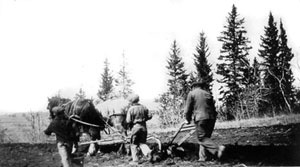 My dad or Pa, as we called him at home, had an obsession for buying land and more land. Fall threshing of the wheat, oats, barley and alfalfa lasted for many weeks. So as I’m saying Pa, or Dad, usually done everything in a big way. When we planted potatoes, we would do it as you see it here, with me driving the team to plant a potato patch twice the size as needed. The garden also was very big. When firewood was cut, enough was cut for two years.
My dad or Pa, as we called him at home, had an obsession for buying land and more land. Fall threshing of the wheat, oats, barley and alfalfa lasted for many weeks. So as I’m saying Pa, or Dad, usually done everything in a big way. When we planted potatoes, we would do it as you see it here, with me driving the team to plant a potato patch twice the size as needed. The garden also was very big. When firewood was cut, enough was cut for two years.
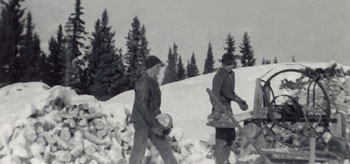 I started playing guitar at about age 6, laying it flat on my lap and hands on top. My much older brother, Carl, was very innovative. He would convert his Spanish guitar to Hawaiian style, then back to Spanish style again. We would listen to the radio intently and copy the cowboy singers of the day. I tried to play all of the little guitar licks just like Wilf Carter. Also sang his songs and yodeled.
I started playing guitar at about age 6, laying it flat on my lap and hands on top. My much older brother, Carl, was very innovative. He would convert his Spanish guitar to Hawaiian style, then back to Spanish style again. We would listen to the radio intently and copy the cowboy singers of the day. I tried to play all of the little guitar licks just like Wilf Carter. Also sang his songs and yodeled.
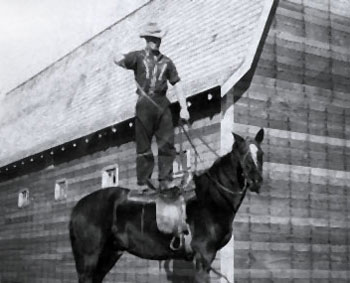 Carl in his late teens, had his work cut out. As well as keeping his four younger brothers and one sister in line, he would decorate his saddle and even made a pinto out of his horse using some dye. He braided ropes and leather things, and made many things on the forge, such as bits and spurs. He insisted on having sister Margaret sew him fancy western shirts.
Carl in his late teens, had his work cut out. As well as keeping his four younger brothers and one sister in line, he would decorate his saddle and even made a pinto out of his horse using some dye. He braided ropes and leather things, and made many things on the forge, such as bits and spurs. He insisted on having sister Margaret sew him fancy western shirts.
My very first playing job was when I was ten and playing at a Henderly school dance. Around about this time Carl entered me into a radio amateur hour in Paradise Hill. I was terrified, but secretly thought to myself that maybe this could be the beginning of me becoming a BIG radio cowboy singer. I thought I was very good and sounded just like Wilf Carter. The big night came with just me and guitar getting up in front of a packed house, I sang “Echoing Hills Yodel Back to Me”. (As I am printing this now, I am feeling a warm painful sensation going through my head). I must go for therapy for this. When I started yodeling, a small girl in the front row started laughing hysterically. I know this girl very well to this day, maybe someday I will confront her.
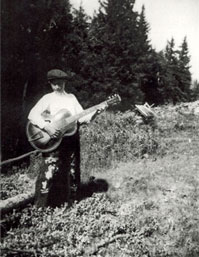 This was the last time that I ever yodeled, until 1991, the day of Wilf’s passing, when I sang a few of Wilf’s songs at a seniors center. In 1998, I recorded my “My Tribute to Wilf” album, doing vocals and over dubbing on guitar, fiddle, mandolin, and accordion. Knowing what I know now about the history of music, I strongly feel that Wilf Carter, as he stands in our history books, is a very under rated pioneer and trail blazer of country and folk music.
This was the last time that I ever yodeled, until 1991, the day of Wilf’s passing, when I sang a few of Wilf’s songs at a seniors center. In 1998, I recorded my “My Tribute to Wilf” album, doing vocals and over dubbing on guitar, fiddle, mandolin, and accordion. Knowing what I know now about the history of music, I strongly feel that Wilf Carter, as he stands in our history books, is a very under rated pioneer and trail blazer of country and folk music.
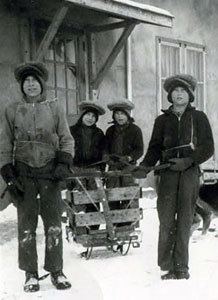 As young kids, our heroes were the talked about around the dinner table men. Maybe it was the certain good man on the threshing crew who could throw on a load of bundles faster than anyone else, or the man who had the best well trained team of horses. There were a few big herds of cattle in the vicinity, and a few men of strong character who lived in bunkhouses or shacks while feeding cattle in the winter, also were some of my big heroes. The men that hauled feed or drove cattle down the roads fascinated us. These idols of ours probably had no idea that as well as setting a good example, they were also badly influencing us. Some of them chewed tobacco and snuff and got a little careless when they went to town. My brothers and I tried chewing the bitter tobacco. After many tries, I finally got it, now at last, I was a man and could be mounted on top a horse in bitter cold and try to spit over the icicles hanging down my chin or beside the wood heater in the bunkhouse.
As young kids, our heroes were the talked about around the dinner table men. Maybe it was the certain good man on the threshing crew who could throw on a load of bundles faster than anyone else, or the man who had the best well trained team of horses. There were a few big herds of cattle in the vicinity, and a few men of strong character who lived in bunkhouses or shacks while feeding cattle in the winter, also were some of my big heroes. The men that hauled feed or drove cattle down the roads fascinated us. These idols of ours probably had no idea that as well as setting a good example, they were also badly influencing us. Some of them chewed tobacco and snuff and got a little careless when they went to town. My brothers and I tried chewing the bitter tobacco. After many tries, I finally got it, now at last, I was a man and could be mounted on top a horse in bitter cold and try to spit over the icicles hanging down my chin or beside the wood heater in the bunkhouse.
We kids built mini hayracks and sleighs. Nothing uncommon on our farm to see a 12 year old boy turning the forge blower, with a big piece of iron in the coals. If someone would ask him what he is doing, you might get the wildest idea you ever heard of.
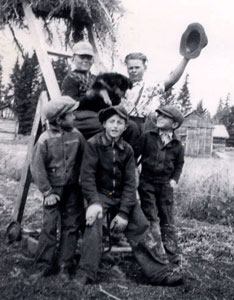 When I was 13 and brother Joe 11, we played at a CJNB radio amateur hour in St. Walburg. We got first prize, with Joe on fiddle, Pete Cydejko on guitar and me on accordion. An article covering the show came out in the town paper next week. I still have the one line well memorized. “The highlight of the evening was three youngsters from Kilronan”.
When I was 13 and brother Joe 11, we played at a CJNB radio amateur hour in St. Walburg. We got first prize, with Joe on fiddle, Pete Cydejko on guitar and me on accordion. An article covering the show came out in the town paper next week. I still have the one line well memorized. “The highlight of the evening was three youngsters from Kilronan”.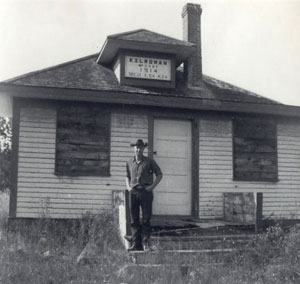 I quit school at grade 8 and joined the threshing crew. Our family started accumulating more cattle. All us brothers wore cowboy hats. We broke a few horses each spring and I became the calving man. We looked forward to going to the dances. Then we got our first amplifier, powered by a 6-volt battery. Sometimes, on our way to the dance, we would stop by a field where there was a tractor and take out a battery that was well charged. The dances did not always turn out as great as expected, and there was a down side as well. The hangovers and lack of sleep the next day was not that great as we tried to look as perky and non affected in front of Dad. A common trick was to get up on time and act as though you,r going to tear up the ground, Then go out to the field and lie down beside the tractor for a while. Our scattered out land came in handy sometimes. Our parish priest would raise hell on the pulpit. “We have all kinds of young people around that can go to dances and play music, and yet no one can get a decent choir together for the church”. We had musical instruments lying all around. In the hayloft, the bunkhouse and workshop. When dad drove off somewhere, a couple of us would grab a guitar and fiddle or whatever, and play a few tunes. Then someone would yell “Pa’s coming!.” We would put everything away and crawl under or on top of some machinery we were working on.
I quit school at grade 8 and joined the threshing crew. Our family started accumulating more cattle. All us brothers wore cowboy hats. We broke a few horses each spring and I became the calving man. We looked forward to going to the dances. Then we got our first amplifier, powered by a 6-volt battery. Sometimes, on our way to the dance, we would stop by a field where there was a tractor and take out a battery that was well charged. The dances did not always turn out as great as expected, and there was a down side as well. The hangovers and lack of sleep the next day was not that great as we tried to look as perky and non affected in front of Dad. A common trick was to get up on time and act as though you,r going to tear up the ground, Then go out to the field and lie down beside the tractor for a while. Our scattered out land came in handy sometimes. Our parish priest would raise hell on the pulpit. “We have all kinds of young people around that can go to dances and play music, and yet no one can get a decent choir together for the church”. We had musical instruments lying all around. In the hayloft, the bunkhouse and workshop. When dad drove off somewhere, a couple of us would grab a guitar and fiddle or whatever, and play a few tunes. Then someone would yell “Pa’s coming!.” We would put everything away and crawl under or on top of some machinery we were working on.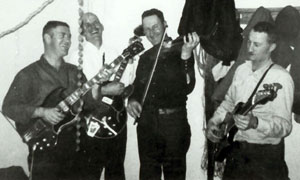 Our musical ability must have been inherited from our mother. As a young girl she played piano at neighbor get-togethers and barn dances, and she was the first organist in the first Catholic Church that was built in our area in 1918. In 1963, brother Joe, cousin Leonard Hardes and myself, started playing together for dances. A few others joined us at different times. We continued playing together for 25 or more years. We played for a few second-generation wedding dances.
Our musical ability must have been inherited from our mother. As a young girl she played piano at neighbor get-togethers and barn dances, and she was the first organist in the first Catholic Church that was built in our area in 1918. In 1963, brother Joe, cousin Leonard Hardes and myself, started playing together for dances. A few others joined us at different times. We continued playing together for 25 or more years. We played for a few second-generation wedding dances.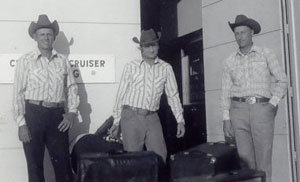 We started out in the days of having to hide your drinks outside and having to watch for cops. We also played for a few rodeos; fiddle tune backing during the events. We were excited being up in the little booth with the announcer, being familiar with the sport,and knowing many of the competitors who competed in infield and chuckwagon events. One rodeo, where the gas engine that ran the power plant for the grounds was balking and missing, I can still see Joe putting down his bass and getting a screwdriver and pliers to try to get the engine running smoothly again. At another rodeo,A long lineup at the only outdoor toilet, with no inside door lock. A friend of ours went to a bluff, timing it at the exact time that a loose bull started running towards the bluff. Only a few of the humorous old memories of those fun days. Later on however, I started getting turned off of rodeo a bit, when I watched the stubborn bulls being whipped and pulled into the chutes. Also the dogging steers being twisted down again and again with their already sore necks. I found it harder to be part of this sport that I once loved. Thinking back now, I think we did pretty good, playing our music over the years with our little band. We never once got into a fight and no one has ever ran off with someone else’s wife.
We started out in the days of having to hide your drinks outside and having to watch for cops. We also played for a few rodeos; fiddle tune backing during the events. We were excited being up in the little booth with the announcer, being familiar with the sport,and knowing many of the competitors who competed in infield and chuckwagon events. One rodeo, where the gas engine that ran the power plant for the grounds was balking and missing, I can still see Joe putting down his bass and getting a screwdriver and pliers to try to get the engine running smoothly again. At another rodeo,A long lineup at the only outdoor toilet, with no inside door lock. A friend of ours went to a bluff, timing it at the exact time that a loose bull started running towards the bluff. Only a few of the humorous old memories of those fun days. Later on however, I started getting turned off of rodeo a bit, when I watched the stubborn bulls being whipped and pulled into the chutes. Also the dogging steers being twisted down again and again with their already sore necks. I found it harder to be part of this sport that I once loved. Thinking back now, I think we did pretty good, playing our music over the years with our little band. We never once got into a fight and no one has ever ran off with someone else’s wife.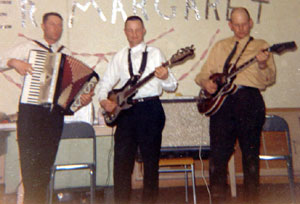 Dad never did hear us play, and even when I recorded my first album in 1969, he was not aware of it. When we got our first TV in 1956, dad surprised us when he told someone, in his German accent, “That singing and dencing on there, I likes that.” His absolute favorite was the fiddle player, Don Messer.Little did he know,that I could play almost as good as Don Messer. Dad hated beer parlors, dances, cowboys, rodeos, or just generally anyone or anything that would keep someone from doing a good days work.
Dad never did hear us play, and even when I recorded my first album in 1969, he was not aware of it. When we got our first TV in 1956, dad surprised us when he told someone, in his German accent, “That singing and dencing on there, I likes that.” His absolute favorite was the fiddle player, Don Messer.Little did he know,that I could play almost as good as Don Messer. Dad hated beer parlors, dances, cowboys, rodeos, or just generally anyone or anything that would keep someone from doing a good days work.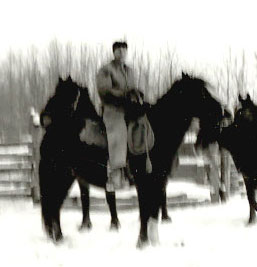 One winter my brother Joe and I cut a large birch tree down and started making a saddle. We took another saddle apart and copied it. It turned out great and I’ve used it all my life. One early Sunday morning Joe and I saddled up and rode 13 miles to a man’s place that had a herd of unbroken horses. We corralled the horses and proceeded to halter break two wild horses. After snubbing them up to our saddle horns, and thinking they would lead, we started out for home. Down the road a ways, Joe’s horse pulled back and his cinch broke. Both green horses were soon galloping over the hills on the loose. After three or more hours of chasing them down in drizzling rain, we finally corralled them again, and again we started for home. This time making it home very late Sunday night. Quite a feat for two teenagers, even if I do say so myself.
One winter my brother Joe and I cut a large birch tree down and started making a saddle. We took another saddle apart and copied it. It turned out great and I’ve used it all my life. One early Sunday morning Joe and I saddled up and rode 13 miles to a man’s place that had a herd of unbroken horses. We corralled the horses and proceeded to halter break two wild horses. After snubbing them up to our saddle horns, and thinking they would lead, we started out for home. Down the road a ways, Joe’s horse pulled back and his cinch broke. Both green horses were soon galloping over the hills on the loose. After three or more hours of chasing them down in drizzling rain, we finally corralled them again, and again we started for home. This time making it home very late Sunday night. Quite a feat for two teenagers, even if I do say so myself.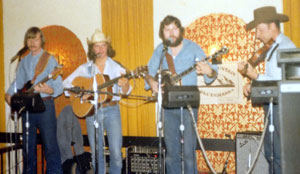 Many times I would close out the jobs and on my way home to Saskatchewan, I would sometimes stop at my brother in law and sister’s place north of Edmonton. I would usually assure them that I would not be coming up here anymore to play in these bars, but some time later, I would pull into their yard, all smiles, and my vehicle all loaded up with amps and instruments. They must have gotten tired of me changing my mind so often. To say record and tape sales were slow would be an understatement. Many times someone sitting at a table full of beer jugs and glasses, and piles of money on the table would say, “I would really like to buy your tape, but just don’t have the money tonight” or “I’ll take the tape and come back and pay you tomorrow night.” My “Miss-right” was slow coming through the door as well. I used to get a kick out of the single musicians that would often say in so many words, that they “were looking for a good decent girl with no bad habits”. If I did finally meet someone that I thought was compatible it seems like I usually ended up with someone that was either singing, crying or fighting. I won’t try to describe living in hotel rooms. The many songs written about lonely hotels speak for themselves. Waking up Sunday morning and looking out side and seeing some broken glass and maybe even a little blood on the sidewalk and then driving halfway across the city looking for a place that is open so you can get a cup of coffee are just some of the exciting things of the big cities. I think Kris Kristopherson’s song that Johnny Cash sings, “Sunday Morning Coming Down” describes it very well. The musician get togethers were enjoyable, however.These were the going for coffee times, after getting off stage, where musicians from different bands would meet. Sometimes the conversations would resemble a support group for abused musicians. The guy cussing out the miserable hotel manager, or a common gripe, “This drunk who insists on coming up and playing your guitar or fiddle”. Another common one “Boy did I get into trouble, this girl that I took out didn’t tell me she had a husband!”Or vice versa. After quitting time at this wild and noisy bar, and almost not being able to take another guy coming up to me and telling me his dad or uncle used to play with Don Messer, I would often go alone to this quiet all-night pizza place where a gorgeous dark girl worked. The stunning quiet and sensible down to earth talk was a welcome change. My dad used to call this “Beer Parlor Dummy Talk”. To be absolutely fair though, I have met some very nice people in bars. Another incident that stands out in my mind, sitting at a bar table at break time, in Jackson Hole, Wyoming with three musicians with puzzled looks on their faces and saying “What in the world are you doing down here in this dingy bar?” It was after someone asked me how many cattle and land I had back in Saskatchewan. Many times I came off the road to the ranch just before calving time. The peace of being out in the country was exhilarating. Sleeping in my own bed and opening my own refrigerator was awesome. The diesel smoke from the tractor and the smell of the barn and feeding grounds were like lying in a bed of roses. My brothers and friends all viewed this as me getting back from holidays and getting back to drudgery. I never tried to explain to them. They would never believe me.
Many times I would close out the jobs and on my way home to Saskatchewan, I would sometimes stop at my brother in law and sister’s place north of Edmonton. I would usually assure them that I would not be coming up here anymore to play in these bars, but some time later, I would pull into their yard, all smiles, and my vehicle all loaded up with amps and instruments. They must have gotten tired of me changing my mind so often. To say record and tape sales were slow would be an understatement. Many times someone sitting at a table full of beer jugs and glasses, and piles of money on the table would say, “I would really like to buy your tape, but just don’t have the money tonight” or “I’ll take the tape and come back and pay you tomorrow night.” My “Miss-right” was slow coming through the door as well. I used to get a kick out of the single musicians that would often say in so many words, that they “were looking for a good decent girl with no bad habits”. If I did finally meet someone that I thought was compatible it seems like I usually ended up with someone that was either singing, crying or fighting. I won’t try to describe living in hotel rooms. The many songs written about lonely hotels speak for themselves. Waking up Sunday morning and looking out side and seeing some broken glass and maybe even a little blood on the sidewalk and then driving halfway across the city looking for a place that is open so you can get a cup of coffee are just some of the exciting things of the big cities. I think Kris Kristopherson’s song that Johnny Cash sings, “Sunday Morning Coming Down” describes it very well. The musician get togethers were enjoyable, however.These were the going for coffee times, after getting off stage, where musicians from different bands would meet. Sometimes the conversations would resemble a support group for abused musicians. The guy cussing out the miserable hotel manager, or a common gripe, “This drunk who insists on coming up and playing your guitar or fiddle”. Another common one “Boy did I get into trouble, this girl that I took out didn’t tell me she had a husband!”Or vice versa. After quitting time at this wild and noisy bar, and almost not being able to take another guy coming up to me and telling me his dad or uncle used to play with Don Messer, I would often go alone to this quiet all-night pizza place where a gorgeous dark girl worked. The stunning quiet and sensible down to earth talk was a welcome change. My dad used to call this “Beer Parlor Dummy Talk”. To be absolutely fair though, I have met some very nice people in bars. Another incident that stands out in my mind, sitting at a bar table at break time, in Jackson Hole, Wyoming with three musicians with puzzled looks on their faces and saying “What in the world are you doing down here in this dingy bar?” It was after someone asked me how many cattle and land I had back in Saskatchewan. Many times I came off the road to the ranch just before calving time. The peace of being out in the country was exhilarating. Sleeping in my own bed and opening my own refrigerator was awesome. The diesel smoke from the tractor and the smell of the barn and feeding grounds were like lying in a bed of roses. My brothers and friends all viewed this as me getting back from holidays and getting back to drudgery. I never tried to explain to them. They would never believe me.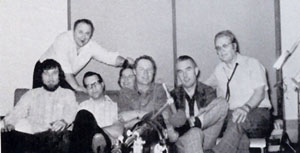 A second LP recorded in 1974, “Two Sides of Old Time Music”. One side was fiddle tunes and the other side accordion tunes. I over dubbed a lot, adding a mandolin part into each fiddle tune. John Muirhead of Gaby Haas fame played sax on the accordian tunes. Joe Kozak,a musician and recording engineer, who has worked with many of the early day famous western Canadian artists, done the recording in his Edmonton studio. Joe continued being a good friend of mine. I’ve relied on him for a lot of advice,being an old pro in the music business. Then the years and a few albums later, took me up to 1997 when I decided to record my “Listening to the Past” album which was a collection of old songs that I’ve heard on early day TV shows. I tried to alter my voice and used some Scottish and Irish accents on the various songs. I then played all the backup music on the recording, except for the bass and studio drums. Studio engineer, Garry McDonall put his 30-year studio experience to work in his Edmonton “DAMON” studio. Garry and I formed a good friendship and working relationship. So much so, that I decided to do another album soon after. This time, singing the songs of my old childhood idol, Wilf Carter. We recorded it the same way again in the studio and pulled it off again. This resulted in my “My Tribute to Wilf” album. In 2001 and 2002, I rounded up some of the best musicians I could find and with lots of hard work, came away with my “My Kind of Music” Album.
A second LP recorded in 1974, “Two Sides of Old Time Music”. One side was fiddle tunes and the other side accordion tunes. I over dubbed a lot, adding a mandolin part into each fiddle tune. John Muirhead of Gaby Haas fame played sax on the accordian tunes. Joe Kozak,a musician and recording engineer, who has worked with many of the early day famous western Canadian artists, done the recording in his Edmonton studio. Joe continued being a good friend of mine. I’ve relied on him for a lot of advice,being an old pro in the music business. Then the years and a few albums later, took me up to 1997 when I decided to record my “Listening to the Past” album which was a collection of old songs that I’ve heard on early day TV shows. I tried to alter my voice and used some Scottish and Irish accents on the various songs. I then played all the backup music on the recording, except for the bass and studio drums. Studio engineer, Garry McDonall put his 30-year studio experience to work in his Edmonton “DAMON” studio. Garry and I formed a good friendship and working relationship. So much so, that I decided to do another album soon after. This time, singing the songs of my old childhood idol, Wilf Carter. We recorded it the same way again in the studio and pulled it off again. This resulted in my “My Tribute to Wilf” album. In 2001 and 2002, I rounded up some of the best musicians I could find and with lots of hard work, came away with my “My Kind of Music” Album.